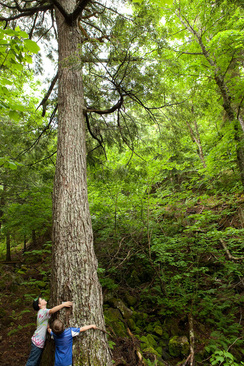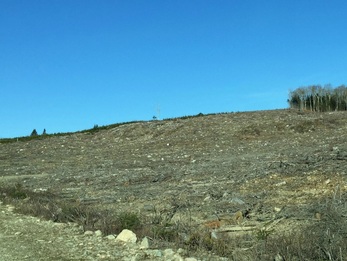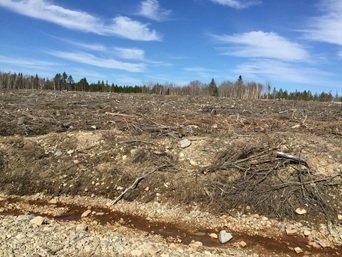

The following Quote was written by Chief Seattle in 1834. It is as relevant today as it was back then:
Humankind has not woven the web of life. We are but one thread within it. whatever we do to the web, we do to ourselves. All things are bound together. All things connect.
Many issues can be covered under climate change. Here is just one:

I have lived on the same property for 32 years; one side is bounded by a dirt road. On the other side of the road was a forest. Not once in all these years have we had a problem with road wash-outs due to rain. Until now. A week after the land was clear-cut, the government (actually the taxpayers) had to repair a badly-washed out road. Now, no matter how many times it is repaired, this keeps on happening.
The reason is clear: Clear-cutting. Without the trees, nothing prevents erosion. The land is washed away by the rain. Instead of the water soaking slowly into the ground, it simply washes away, taking topsoil with it. This is happening all over New Brunswick and causing hardship for many communities, infrastructure damage, and the destruction of our environment. You were concerned about coastal erosion? It is happening right inside the provincial boundaries, as well.
Clear cutting makes a desert of the forests. Forests absorb rain, filter water and give us clean air. Natural areas help alleviate climate change because they capture and store carbon dioxide. There is great biodiversity in our forests and grasslands that provide critical habitat for plants, animals and insect species. People who spend time in the forest are generally healthier because it alleviates stress. Need I go on?

The Elgin Eco Association has send a portfolio and request to the Minister of Natural Resources to preserve 1000 acres of crown land for our growing mountain bike trail tourism industry. Tourism provides employment and income without the destruction of our natural resources. The practice of clear cutting does not receive a favourable impression in other countries when it comes to trade.
On another note, you are looking for strategies that will provide the highest economic benefit for the province. You are asking what steps are required toward a low-carbon future and what specific elements of the low-carbon economy should New Brunswick pursue?
These are very loaded questions. In my short life, I have learned that 1000 people have 1000 different opinions. I am not a scholar or have a university degree in science. I just know and see that things in our environment are going downhill very fast. In the Netherlands and Europe they have been working on this issue of climate change for decades. Despite the ignorant view of the biggest polluting countries, they have forged ahead to making positive changes towards a better and cleaner environment. Perhaps you could look at their model for answers to these questions.
Their final report can be accessed/downloaded here.
 RSS Feed
RSS Feed